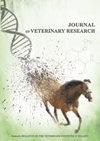犬睾丸中睾酮表达的研究
IF 1.3
3区 农林科学
Q2 VETERINARY SCIENCES
引用次数: 0
摘要
睾丸蛋白是一种参与细胞移动、粘附和集落形成的蛋白。在大鼠中,有报道称睾丸存在于睾丸中,并提出了其在精子发生中的可能作用。对人类的研究也表明了睾丸素作为一种癌症抑制蛋白的可能作用。狗是一种重要的宠物物种,也是研究睾丸生物学和病理过程的良好动物模型,但从未报道过睾丸的存在。材料与方法研究了睾丸素在胎儿、青春期前、成年和老年犬睾丸中的表达情况。对5只成年犬和3只老年犬、2只1月龄幼犬和2只妊娠末期流产胎儿的睾丸进行了免疫组织化学检测。结果睾酮在睾丸支持细胞中均有强烈表达。在成熟犬和未萎缩的老年犬的睾丸区域,精子也呈阳性。在所有检测的睾丸中均检测到弱表达。结论本研究首次证实了犬睾丸中存在睾丸蛋白,为进一步开展犬人比较研究和进一步研究睾丸蛋白在犬生理、生殖和睾丸病理中的作用奠定了基础。本文章由计算机程序翻译,如有差异,请以英文原文为准。
Study on the expression of testin in the testes of dogs
Abstract Introduction Testin is a protein involved in cell mobility, adhesion and colony formation. In rats, testin presence has been reported in the testes, and its possible role in spermatogenesis has been suggested. Studies in humans also suggest a possible role of testin as a cancer suppressor protein. In the dog, which represents both an important pet species and a good animal model for studying biological and pathological testicular processes, the presence of testin has never been reported. Material and Methods In the present study, the expression of testin in foetal, prepubertal, adult and aged canine testes was investigated. Testes from 5 adult and 3 aged dogs, from 2 one-month-old puppies and from 2 foetuses miscarried at the end of pregnancy were immunohistochemically examined with a commercial antibody against testin. Results Testin was intensely expressed in Sertoli cells in every testis examined. Spermatids were also positive for testin in mature dogs and in the testicular areas of the aged ones which were not atrophic. Weak expression of testin was also detected in all testes examined. Conclusion The present study, the first demonstrating the presence of testin in canine testes, provides the basis for further dog–human comparative research and for studies on the role of this protein in canine physiology, reproduction and testicular pathologies.
求助全文
通过发布文献求助,成功后即可免费获取论文全文。
去求助
来源期刊

Journal of Veterinary Research
Veterinary-General Veterinary
CiteScore
0.90
自引率
5.60%
发文量
58
审稿时长
18 weeks
期刊介绍:
Journal of Veterinary Research (formerly Bulletin of the Veterinary Institute in Pulawy) is a quarterly that publishes original papers, review articles and short communications on bacteriology, virology, parasitology, immunology, molecular biology, pathology, toxicology, pharmacology, and biochemistry. The main emphasis is, however, on infectious diseases of animals, food safety and public health, and clinical sciences.
 求助内容:
求助内容: 应助结果提醒方式:
应助结果提醒方式:


